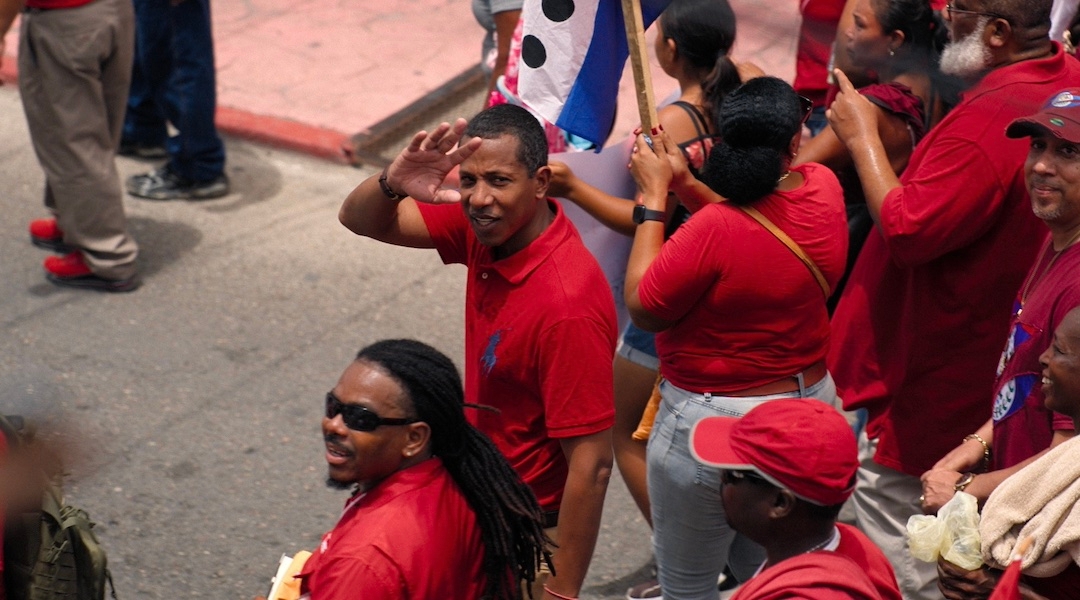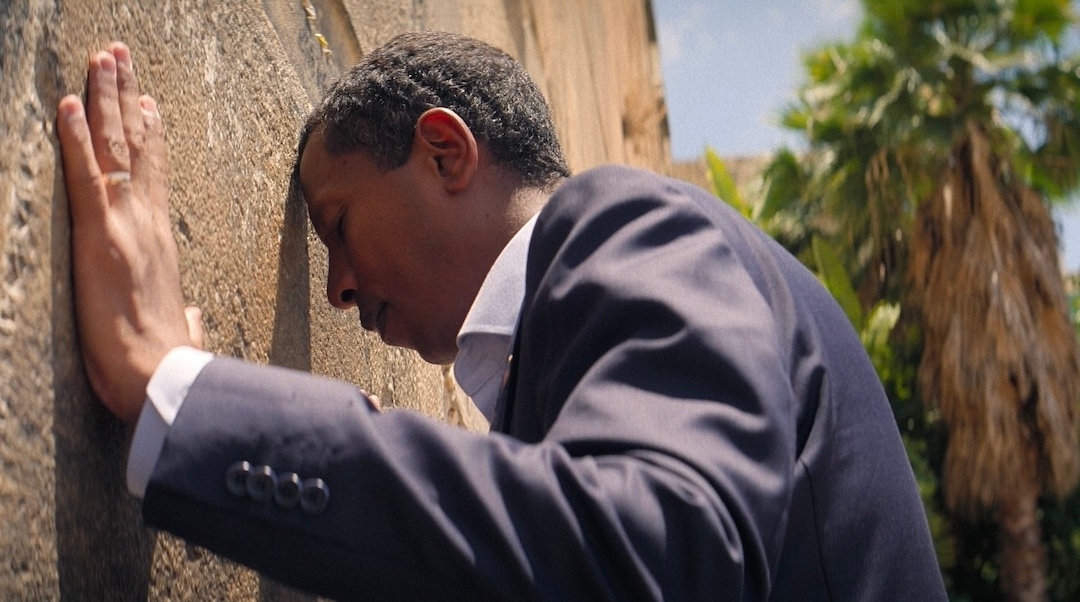Back in 2011, a new arrival to Jerusalem drew international attention: The rapper Shyne had become an Orthodox Jew in prison and landed in Israel after being deported following his release.
But Shyne soon disappeared from the holy city, joining countless others in having made it only a temporary home.
Now, more than a decade later, a new documentary sheds light on why Shyne left — and where he’s been since. “The Honorable Shyne” premieres this week on Hulu and includes the former rapper’s response to the sex-trafficking scandal that has descended on his mentor Sean “Diddy” Combs.
In an interview about the new film, Shyne — born Jamal Michael Barrow — spoke about his Jewish identity, the nightclub shooting that resulted in his 10-year sentence and his new chapter as a politician and the leader of the Belize United Democratic Party, the Central American nation’s leading opposition party.
“People have been asking me to do a documentary for quite some time, for the last two decades,” said Shyne, who now goes by the name Moses Michael Levi Barrow. “But I required the right partnership, which meant that we had to be aligned as well as the story we wanted to tell, so many different stories that could be told, and I didn’t want to be in the business of bastardizing the story, prostituting myself for sensationalism.
“I wanted to tell a unique story of integrity, of indefatigability,” he said, “and just all of these great things that human beings have within them.”
Born in Belize before he moved with his mother to Brooklyn as a child, Shyne began his rap career as a teenager in the 1990s, enjoying a meteoric rise as part of the Bad Boy Records label founded by Combs.
Shyne was arrested in 1999, and convicted two years later, in connection with a nightclub shooting at which both Combs and Combs’ then-girlfriend, Jennifer Lopez, were present. Shyne was convicted on charges of assault, reckless endangerment and weapons possession and sentenced to 10 years, while Combs was acquitted.
Shyne emerged from his nine years in prison as a practicing Orthodox Jew. Deported from the United States in 2009, he lived in Israel for two years, residing in Jerusalem. He collaborated with the musician Matisyahu in 2010 and drew a great deal of media attention for his striking transformation, which included wearing sidelocks and changing his first name to “Moses.”
In 2013, he returned to Belize, where his father, Dean Barrow, is a former prime minister.
The new documentary, directed by Marcus A. Clarke and produced in association with the ESPN and Disney-associated brand Andscape, traces Shyne’s music career, the trial and incarceration, and his thoughts about Combs, who recently drew federal racketeering and sex trafficking charges.
The film also touches on Barrow’s uniquely compelling Jewish journey.
While it was reported that Barrow “converted” to Judaism during his incarceration, that’s not quite correct, he said in the interview.
“I didn’t convert, I was born [with] Jewish heritage,” he said. He said his grandmother was of Ethiopian Jewish heritage.
“For me, being a Jew is not a racial thing, it’s not an ethnic thing, it’s a spiritual thing,” he said. “Judaism, for me, came about in Brooklyn, where I found myself faced with death and imminent danger every day that I would walk out of my house, and I’d say friends get their heads blown off right next to me. I needed to pray to survive, to exist beyond the statistical deadline of jail or death at the age of 21.”
Barrow grew up in Brooklyn’s East Flatbush section, where he said he was often in trouble and was shot in the shoulder when he was 15.
“So that’s why I started praying … I started praying to God, I just wanted to be alive,” he said. “I’m 46 years old, and for the last 30 years, I’ve prayed every day, I prayed to the Most High.”
In June 2001 he was convicted of assault for the nightclub incident and sentenced to 10 years in prison.
“And so when I went to prison, what happened is, I codified my spirituality,” he said. “I had been praying in a monotheistic way, my inspiration was Moses, and all these figures, Abraham and David, the king, and Joseph the Tzadik [righteous one]. And so you had to go from just reading about this in the Torah, to ‘what are the actual practices?’ So that’s what I didn’t have before I went to prison.”
Both in prison and during his sojourn in Israel, Shyne implies that he wasn’t always accepted in Jewish spaces, as a Black man and person of Caribbean heritage.
He spoke of being rejected by a rabbi in Rikers Island, where he was incarcerated for part of the sentence, who told him, “What do you mean you’re Jewish?”
“I had a difficult time being Jewish in prison,” he said. “Certainly, it was an anomaly, I guess, because most [African and Caribbean-Americans] who go to jail, they become Muslim.” But during that time, he began donning tefillin, keeping a strict kosher diet and observing Shabbat.
He remembered one man coming into Rikers who “smelled like oil” and happened to be Jewish.
“He was talking about kabbalistic teachings — not like Madonna kabbalah,” he said, the latter a reference to the Los Angeles-based movement best known for teaching a version of Jewish mysticism to Hollywood celebrities. “I read a few books that he gave me that truly blew my mind.”
Barrow says in the film that after he was released he went to Israel to celebrate Rosh Hashanah and ended up staying for more than two years. As part of his becoming more observant, he even underwent a ritual circumcision in his 30s. Shyne returned to Israel and filmed interviews in the Old City of Jerusalem for the documentary.
At one point, Barrow says, he was rejected by Ohr Somayach, a yeshivah in Israel that caters to Jews who did not grow up Orthodox.
“For me, the experience, the studying, the mentorship, had its limit,” he says in the film. Barrow ultimately concluded that “I thought that being ultra-religious created more division and barriers for me.” He moved away from haredi Orthodoxy and ultimately returned to Belize.

Barrow, who now serves as the main opposition leader in the Belize House of Representatives, is seen in a still from the new documentary, “The Honorable Shyne.” (Andscape)
Barrow, however, remains a practicing Jew, even producing and showing his travel tallit bag during our interview, monogrammed with his Hebrew name, “Moshe Ben David.”
“I’m a hybrid,” he told JTA. “I fast on Yom Kippur, I wrap tefillin every day.” However, “Friday night, if I have to do something, I do it. So I don’t observe on that level.” In Belize, he observed Sukkot, the autumn harvest holiday.
“I maintain a kosher diet, in the sense that I don’t eat non-kosher foods,” he added.
Barrow did not, at any point, testify against Combs or anyone else in the shooting case, and he even participated in an on-stage Bad Boy Records reunion at the BET Awards in 2022. In the film and in recent interviews, however, he is critical of Combs for calling witnesses to pin the blame on him for the shooting — an accusation Combs denies.
The documentary was in production for about two years and includes an interview that was shot after Combs’ homes were raided in the spring of 2024, months before “Diddy” was indicted for, according to the U.S. Attorney, abusing women and engaging in sex trafficking.
“Before the raid, there was a lawsuit that came out where a gentleman [producer Rodney “Lil Rod” Jones] was alleging that Diddy told him that he shot the club up and that he made me serve time,” Barrow told JTA. “And that was really a trigger. And then you had a victim that came out and said what she’d been saying all along, that Diddy was the one who shot her in the face, and it wasn’t Shyne. So I’ve been saying that I was only defending myself, and I’ve been saying that there were other guns fired in the club that night.”
Combs denies all the allegations against him.
In the film, Barrow responds to a video from 2016 that allegedly depicts Diddy assaulting his former girlfriend. “I had to disassociate myself from him and condemn those actions,” he says in the film.
In November 2020, Barrow won a seat in the Belize House of Representatives, promising lower-interest student loans and a crackdown on crime, as a member of the center-right Belize United Democratic Party.
Speaking as a political figure, and one who was deported to his home country after his release from prison, Shyne struck a neutral tone on the recent election of Donald Trump to a second, non-consecutive term.
“The relationship between Belize and the United States has been 43 years, and we’ve seen many presidents,” he added. “We’ve really benefited a lot from President Biden and Vice President Harris,” referencing a $250 million grant from the Millennium Challenge Corporation.
“On behalf of the Belizian people, It’s very important for me to remain impartial, for me to have relationships that transcend partisanship,” he said. “I wish the president-elect well, and I also gave well wishes to Vice President Harris, for putting forth a formidable candidacy.”
JTA has documented Jewish history in real-time for over a century. Keep our journalism strong by joining us in supporting independent, award-winning reporting.






